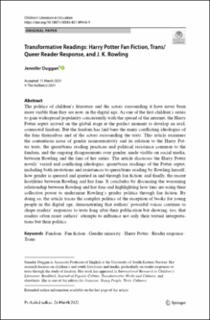Transformative Readings: Harry Potter Fan Fiction, Trans/Queer Reader Response, and J. K. Rowling
Peer reviewed, Journal article
Published version
Permanent lenke
https://hdl.handle.net/11250/3026717Utgivelsesdato
2021Metadata
Vis full innførselSamlinger
Originalversjon
Duggan, J. (2022). Transformative Readings: Harry Potter Fan Fiction, Trans/Queer Reader Response, and J. K. Rowling. Children's Literature in Education, 53(2), 147-168. https://doi.org/10.1007/s10583-021-09446-9Sammendrag
The politics of children’s literature and the actors surrounding it have never been more visible than they are now, in the digital age. As one of the first children’s series to gain widespread popularity concurrently with the spread of the internet, the Harry Potter septet arrived on the global stage at the perfect moment to develop an avid, connected fandom. But the fandom has laid bare the many conflicting ideologies of the fans themselves and of the actors surrounding the texts. This article examines the contentious issue of gender nonnormativity and its relation to the Harry Potter texts, the queer/trans reading practices and political resistance common to the fandom, and the ongoing disagreements over gender, made visible on social media, between Rowling and the fans of her series. The article discusses the Harry Potter novels’ varied and conflicting ideologies; queer/trans readings of the Potter septet, including both invitations and resistances to queer/trans reading by Rowling herself; how gender is queered and queried in and through fan fiction; and finally, the recent hostilities between Rowling and her fans. It concludes by discussing the worsening relationship between Rowling and her fans and highlighting how fans are using their collective power to undermine Rowling’s gender politics through fan fiction. By doing so, the article traces the complex politics of the reception of books for young people in the digital age, demonstrating that authors’ powerful voices continue to shape readers’ responses to texts long after their publication but showing, too, that readers often resist authors’ attempts to influence not only their textual interpretations but their politics.

